托尼_莫里森-43页PPT资料
托妮莫里森

人物生平
2008年在纽约演讲 托妮·莫里森生于俄亥俄州钢城洛里恩,父亲是船厂焊接工。母亲是忠实教徒并且参加教 会歌咏队,在白人家帮佣。为了逃避种族歧视,父母从俄州(美国中西部)迁徙到美国南方,又为了工作迁移到 北方。父母都为黑人文化感到骄傲,她从小在家里学会无数的黑人歌曲,听过许多南方黑人的民间传说。在黑人 文化的影响和熏陶下,她读遍与此相关的书籍,尤其对文学有兴趣。
谢谢观看
托 妮 ·莫 里 森
美国黑人女作家、诺贝尔文学奖得主
01 人物生平
0Байду номын сангаас 获奖记录
目录
02 主要成就 04 人物评价
托妮·莫里森(1931年2月18日-2019年8月5日),美国黑人女作家,生于俄亥俄州洛雷恩。霍华德大学毕 业。20世纪60年代末登上文坛,其作品情感炽热,简短而富有诗意,并以对美国黑人生活的敏锐观察闻名。主要 作品有《最蓝的眼睛》(1970)《苏拉》(1974)《所罗门之歌》(1977)和《柏油娃》(1981)等。1989 年起出任普林斯顿大学教授,1993年获诺贝尔文学奖。
获奖记录
人物评价
托妮·莫里森 1993年莫里森获诺贝尔文学奖,瑞典文学院给她的评价是:“在小说中以丰富的想象力和富有 诗意的表达方式使美国现实的一个极其重要方面充满活力”。
《观察家》报:“当她开口讲话,整个美国都洗耳恭听。”
瑞典文学院常务秘书斯图尔·埃伦:“莫里森“在小说中以丰富的想象力和富有诗意的表达方式使美国现实 的一个极其重要的方面充满活力”。
主题
黑人种族托妮·莫里森新经典中文作品集(9张) 托妮·莫里森自觉地将小说创作与民族解放使命联系起来,用她的 笔淋漓尽致地描绘了当今黑人民众的生存境遇,从中揭示出霸权文化对少数族裔文化的破坏。不仅如此,她还力 图通过文学话语呼吁黑人知识分子转向黑人民族文化本身,从过去那些被白人主流文化鄙弃的传统中重新建构民 族意识。同时,身为一名女作家,莫里森又凭借她独特的女性视角,依托其特殊的女性经历,把黑人女性寻求自 我的历程和重构黑人民族意识的进程紧密相连,形成交互共进的发展趋势。
托妮莫里森《宠儿》解析解析
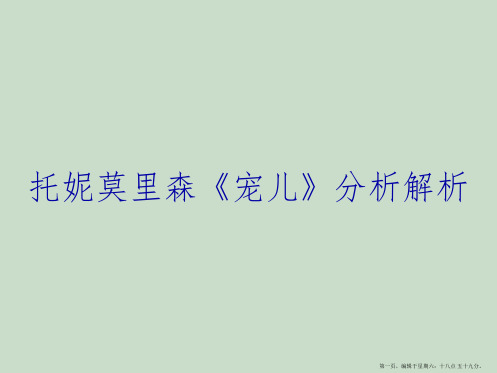
❖ 托尼-莫里森像个魔术师一样,把不同的声音结合组织起来,构筑成不同的人物形象,而不是把自己的观点生硬 地塞给读者。她要使读者在阅读过程中真正走进小说里,同她一起品味主人公生活的甘苦,内心世界的奥妙。那 是一个黑人女孩在一个充满丑陋、歧视、欺凌的世界中,在来自另一个世界的“蓝色眼眸”的诱惑下,对美丽人 生的梦幻。在她身上,你能够看到托尼-莫里森成熟塑造的“苏拉”(93年诺贝尔文学奖获奖作品《苏拉》的主人 公)的影子。
❖ 萨拉/布莱克本:莫里森依然处于扎起人们对黑人女作家的有限归类中。莫里森才华出众,不应该仅仅把自己停留在超凡 地记录美国乡土生活中的黑人生活中。
第四页,编辑于星期六:十八点 五十九分。
矛盾评价的原因
❖ 一是莫里森的作品使她赢得更大范围的认可; ❖ 二是人们开始重新反思所谓“美国”;重新反思盎格鲁-美国文化与非裔美国文化的关系;按四对于文
4、奴隶的反抗之路
❖ 黑尔等四十八个黑奴的逃走;
❖ 塞丝怀孕逃走;
❖ 西克索的反抗; ❖ 塞丝的杀婴;
❖ 斯坦普的沿河送递逃离的奴隶;
第二十五页,编辑于星期六:十八点 五十九分。
❖ 身体的自由
❖ 精神的自由
❖ “林间空地”
5、黑人的自由
第二十六页,编辑于星期六:十八点 五十九分。
二、黑人的文化身份认同
第十页,编辑于星期六:十八点 五十九分。
荣誉 ❖ 托尼·莫里森于1993年获得诺贝尔文学奖,成为获此殊荣的第一位黑人女作家.莫里森善于运用不同的叙事技巧来讲故事。
她通过叙事者来实现自己的创作意图和控制审美距离。在莫里森的小说世界里,历史、追寻和对语言的处理是不可少的。 通过这些揭示了当代美国社会中黑人文化逐渐被白人主流文化游离、渗透和颠覆,从而对黑人的生存状态进行了反思和质 询,此外,莫里森还运用黑人传说和神话来增添作品的艺术魅力。通过对她几部作品的主题及写作技巧的简要分析,展示 这位美国女作家的艺术风格。
American literaturePPT课件
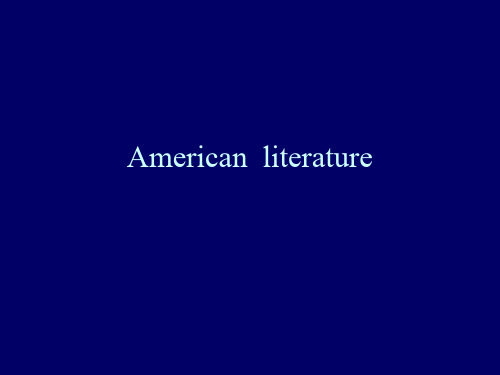
Nationalistic Orientation (2)
3. “Good” literature: embodiment of American national spirit – e.g. F. O. Matthiessen in American Renaissance (1941) enshrines five writers for their devotion to “democracy”, dismissing Mrs. Stowe’s Uncle Tom’s Cabin (1852) as second rate popular writing only. cf. The Scarlet Letter (1850) Moby Dick (1851) Walden (1854) Leaves of Grass (1855) Americanness vs Excellence
Indians? • Literature most representing American
national spirit by American citizens? • – women’s domestic / private literature? • Literature created by American citizens
Hawthorne: cultural production
1. Evert Duyckinck, who managed the magazine United States Magazine and Democratic Review , advocate of American literary nationalism, proponent of high culture
托尼_莫里森
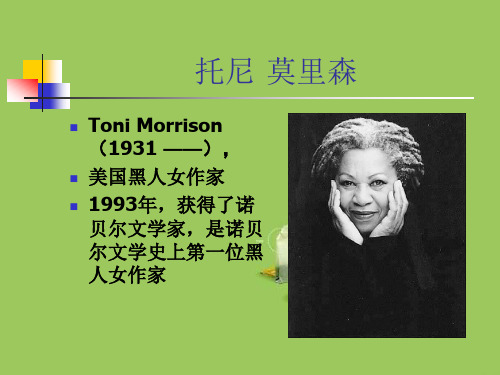
1、《最蓝的眼睛》:研究主要集中在主 题分析、创作手法和人物分析 主题研究主要从性别种族文化的角度 创作手法:小说的结构评析和对象征意象 的分析 单独对人物分析比较少
2、《秀拉》:国内研究主要是主题分析、 叙述特征分析和女性主义等方面 主题分析主要是女性的自我建构和价值 实现 特征分析中叙事特征分析相对较多
4、爱
莫里森的作品,爱是贯穿始终的主题。家庭的 关爱,社区黑人的集体关爱,民族之间的爱, 对自己的爱
5、历史
美国黑人如果不愿意接受历史,无论他们到哪 里,到那块大陆都不会有未来。接受自己的过 去——自己的历史——并不等于要沉溺其中, 而是要学会在其中受益。
6、魔幻与现实交替
将现实主义和黑人神话结合在一起
第三,“娇女”代表了黑人现实中仍就 在遭受的不平等的苦难,是过去苦难的 延伸。 娇女是每个人的娇女,是每个黑人心目 中那段惨痛的历史记忆。
(三)Theme(主题)
1.黑人分裂自我的重新整合。 莫里森:“我热爱我的人民,我首先是 作为一个黑人,一名黑人女性在写作。” 《娇女》的开篇题词“六千万甚至更多” 莫里森:“种族主义的创伤,对种族主 义者和牺牲者,都是自我的严重分裂, 对我来说永远是导致精神病的原因(而 不是症状)”。
访谈录的翻译资料有四篇 1、余正、邹旭东翻译的尼利· 麦凯与莫 里森的访谈录 2、王家湘摘译的“访托尼· 莫里森” 3、少况译的托马斯· 勒克莱尔与莫里森 的访谈录“语言不能流汗” 4、托马斯· 勒克莱尔采访的
莫里森生平、思想和创作的总体研究
第十一讲《宠儿》

宠儿的意义
• 以少女身份出线的宠儿作为连接过去与现 在的纽带,以历史重负的淡化与解脱逐渐 唤醒塞思,并使之在精神上复活。 • 作为过去的象征——她自己的被谋杀,以 及通过她所回忆起的中央通道的集体恐 怖——宠儿必须首先被“重新-记忆”并 “重新-回归”,又必须被毁灭,使塞思能 重新苏醒,面对过去,并面向未来。
托尼莫里森的创作
• • • • • • • • • 《最蓝的眼睛》The Bluest Eye 1970 《秀拉》Sula 1973 《所罗门之歌》Song of Solomon 1977 《柏油孩子》Tar Baby 1981 《宠儿》Beloved 1987 获普利策小说奖、美国 图书奖 《爵士乐》Jazz 1992 《天堂(乐园)》Paradise 1999 《爱》Love 2003 《怜悯》A Mercy 2008
治愈创伤3-白人的参与
• 爱弥 • 鲍德温兄妹
治愈的主要仪式 —塞思的记忆与面对过去
• 保罗/D的到来迫使塞思面对她的过去(她 作为一个奴隶和一个母亲的不可兼容性) • 宠儿使得塞思孤立在屋子里,迫使塞思承 受过去的痛苦和羞耻 • 塞思仪式上的“干净”:社区的女人们帮 助她摆脱了宠儿的纠缠,赛思体验了与前 不同的创伤场景的重复。
《宠儿》中的口头语与书面语
• 呈现一种语言学表达的关注: • 口头话语 • 书面话语 • 产生了对语言的生产与意义的构建
身体政治
• 奴隶制时期奴隶主对奴隶身体的控制、侵 犯与规训; • 作为奴隶的非裔美国人如何利用自己的身 体——自己受到摧残、损毁的身体——来 确立自己的身份,并化解、颠覆奴隶主的 强制与摧残
奴隶制作为非裔美国人民族的创伤
• “学校老师”与侄子们的残暴 • 隐藏在加纳夫妇行为下的种族歧视
第五讲托妮 · 莫里森
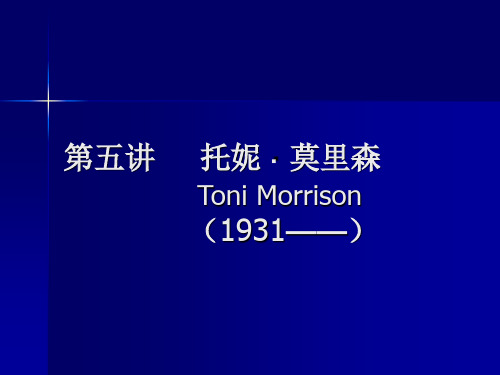
“是她自己撒了慌。恩赐根本不存 在——不论想象的还是真实的——而 ——不论想象的还是真实的——而 ‘林间空地’上阳光中的舞蹈丝毫不能 林间空地’ 改变这个事实。她的忠诚、她的爱、她 的想象力和她那颗伟大的大心,在她的 儿媳妇到来的第28天开始崩溃。” 儿媳妇到来的第28天开始崩溃。” “她下了床,慢悠悠地颤到起居室 的门口,向塞丝和丹芙宣告她从六十年 奴隶生涯和十年自由人的日子中学到的 一课:这世界上除了白人没有别的不 幸。” 幸。”
1. 现实层面:受白人蹂躏的女奴 2. 超现实魔幻层面 :还魂的女儿
一个穿戴整齐的女人从水中走出来。她 好不容易才够到干燥的溪岸,上了岸就立刻 靠着一棵桑树坐下来。整整一天一夜,她就 坐在那里,将头自暴自弃地歇在树干上,草 帽檐都压断了。……她浑身精湿,呼吸急促, 帽檐都压断了。……她浑身精湿,呼吸急促, 一直在同自己发沉的眼皮较量。白天的轻风 吹干她的衣裙;晚风又把衣裙吹皱。没有人 看见她出现,也没有人碰巧从这里经过。即 使有人路过,多半也会踌躇不前。不是因为 她身上湿淋淋的,也不是因为她打着瞌睡或 者发出哮喘似的声音,而是因为她同时一直 在微笑。
“她尽量不去记忆,因为只有这样才 是安全的。” 是安全的。” “记忆”是一个十分重要的主题,黑 记忆” 人如何走出“记忆缺失症” 人如何走出“记忆缺失症”造成的麻木、 遗忘,是小说叙事的中心,是小说主要 意涵所在。
“甜蜜之家” 甜蜜之家”
加纳先生 加纳太太 学校老师 塞丝 黑尔 保罗· 保罗·D 保罗· 保罗·A 保罗· 保罗·F 西克索(Six西克索(Six-O)
《最蓝的眼睛》(1970) 最蓝的眼睛》 1970) 《秀拉》(1973) 秀拉》 1973) 《所罗门之歌》(1977) 所罗门之歌》 1977) 《柏油娃》(1981) 柏油娃》 1981) 《宠儿》(1987) 宠儿》 1987) 《爵士乐》(1992) 爵士乐》 1992) 《乐园》(又译《天堂》,1998) 乐园》 又译《天堂》 1998) 《爱》(2003) 2003) 《仁慈》(2008) 仁慈》 2008)
美国黑人文学和托尼莫里森精品PPT课件

黑人文学正从边缘向主流位移
就文学作品本身来说,许多黑人作家从一开 始就着力表现自我的失落,而这一主题亦是 20世纪美国主流文学的关注点。黑人的体 验——在一个自己无能为力的世界中自我的 失落感觉,或被迫处之局外的感觉——引起 社会的共鸣,成为现代人普遍的体验。
以美国黑人的生活为主要表现对象
女作家赫斯顿(Zora Neale Hurston) :长篇 小说《他们眼睛望着上帝》(Their Eyes Were Whiching God》发表于1937年 ,是 30年代美国黑人文学最重要的作品
赖特
30至40年代美国左翼文学中所谓“抗议小说” 的创始人之一
赖特(Richard Wright)出版短篇小说集 《汤姆叔叔的孩子们》(Uncle Tom,s Children) ,1938,采用传统手法,把黑人 描写成白人的受害者和牺牲品
小说方面,赖特(Rich Wright)的《土生子》 是40年代城市现实主义最出色的代表作。十 二年后,艾里森(Ralph Ellison)写出《看
不见的人》,被许多评论家认为是美国战后 “最杰出的一部作品”。1983年沃克(Alice Walker)的《紫颜色》获普利策图书奖。五 年后,莫里森(Toni Morrison)的《娇女》也 获得该图书奖。1993年莫里森又荣获诺贝尔 文学奖。
第五节 美国黑人文学和托尼·莫里 森
一、美国黑人文学
在诗歌方面,黑人诗人休斯(Langstm Hughes)、海登(Robert Hayden)、安 吉罗(Maya Angelou)、达夫(Rita Dove) 等人是美国诗坛重要的声音,他们的诗篇大 大拓宽了美国诗歌的领域。
在戏剧方面,汉丝贝丽(L0orraine Hansberry)、福勒(Charles Fuller)、威 尔逊(August Wilson)等人的剧作给美国 剧坛吹来一阵新风。
大学英语一课件--Unit4 Tony Trivisonno’s American Dream
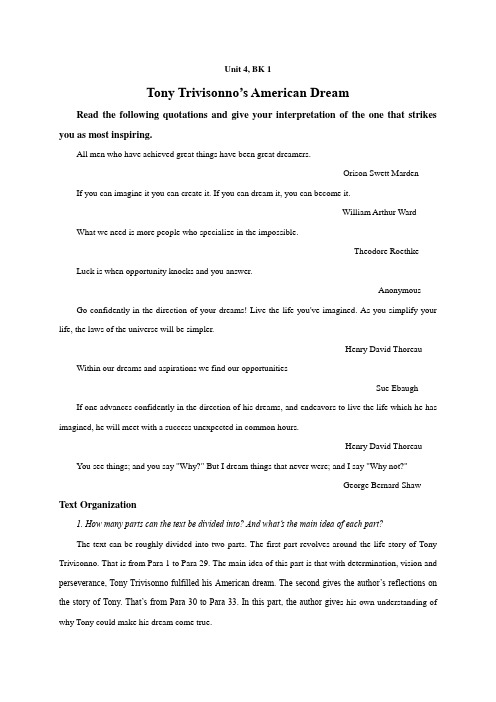
Unit 4, BK 1Tony Trivisonno’s American DreamRead the following quotations and give your interpretation of the one that strikes you as most inspiring.All men who have achieved great things have been great dreamers.------Orison Swett Marden If you can imagine it you can create it. If you can dream it, you can become it.----- William Arthur Ward What we need is more people who specialize in the impossible.------ Theodore Roethke Luck is when opportunity knocks and you answer.------Anonymous Go confidently in the direction of your dreams! Live the life you've imagined. As you simplify your life, the laws of the universe will be simpler.------ Henry David Thoreau Within our dreams and aspirations we find our opportunities------ Sue Ebaugh If one advances confidently in the direction of his dreams, and endeavors to live the life which he has imagined, he will meet with a success unexpected in common hours.------ Henry David Thoreau You see things; and you say "Why?" But I dream things that never were; and I say "Why not?"------George Bernard Shaw Text Organization1. How many parts can the text be divided into? And what’s the main idea of each part?The text can be roughly divided into two parts. The first part revolves around the life story of Tony Trivisonno. That is from Para 1 to Para 29. The main idea of this part is that with determination, vision and perseverance, Tony Trivisonno fulfilled his American dream. The second gives the author’s reflections on the story of Tony. That’s from Para 30 to Para 33. In this part, the author give s his own understanding of why Tony could make his dream come true.2. As is already mentioned, the first part of the text centers on the life story of Tony. The story is, actually, made up of several events which go a long way towards Tony’s realizing his ambition. Go through the first part again and list the main events.1)Tony volunteered to work as a help at Mr. Crawford’s house.2)Tony asked for a job clearing snow at Mr. Crawford’s factory.3)Tony learned to become a skilled worker.4)Tony bought a house with Mr. Crawford’s help.5)Tony bought a farm and sent for his family back in Italy.Language Pointscomprehend understand sth. fully 全面了解、理解、领会I cannot comprehend how you could have been so stupid.He comprehends that he must improve his work, or fail the course.比较comprehensible和comprehensivecomprehensible capable of being understood; clear, intelligible能理解的a book that is comprehensible only to specialistsHer writing is quite comprehensible.comprehensive that includes nearly everything(几乎)包罗万象的;全面的She has a comprehensive grasp of the subject.Our company has a comprehensive health plan that covers expenses for doctors, hospital, medicine and dental care.turn away refuse to allow sb. to enter a place; refuse to give help or support to sb. 不准某人进入某处;拒绝帮助或支持某人The security guard turned away people who didn’t have invitations to the party.Hundreds of people had to be turned away from the stadium because it was full.assume accept sth. as true before there is proof 假定;假设;设想;以为I assume that the present situation is going to continue.We must assume him to be innocent until he is proved guilty.put on or display sth. falsely; pretend 装作;假装assume ignorance, indifference, an air of concernThe look of innocence she assumed had us all fooled.begin to act in or exercise sth; undertake; take on 开始从事;承担;担任The winner of the election assumed the office of senator.compliment sb. on sth. express praise or admiration of sb.(对某人)表示赞美或敬佩I comprehended her on her skillful performance.She complimented the nine-year-old boy on his good manners.work out calculate sth. 计算;算出I’ve worked out your share of the expenses at $10.develop, formulate 想出;制订出The president worked out a solution to the company’s problems.capacity the ability to contain, hold or absorb 容量,容积a hall with a seating capacity of 2000That restaurant has a 100 seat capacity.ability to produce, experience, understand or learn sth. 生产、体会、理解或学习的能力She has an enormous capacity for hard work.This book is within the capacity of younger readers.turn sb./sth. down reject or refuse to consider (an offer, a proposal, etc. or the person who makes it) 顶回或拒不理会(好意、建议等或提议的人)He tried to join the army but was turned down because of poor health.He asked Jane to marry him but she turned him down/turned down his proposal.delighted very pleased; showing delight 非常高兴的;显示愉快的I’m delighted at your success/to hear of your success/that you succeeded.I am delighted to accept your invitation to dinner.“Will you come to the party?” “I’d be delighted to!”for sale available for purchase 待售;供出售We don’t want our car anymore; it is for sale.比较on sale available for a lower price than usual 廉价出售;降价销售I bought this coat on sale, for $20 less than the original price.wreck sth. or sb. ruined 被严重破坏之物;受到了严重损害的人After the accident, his car was a wreck.He is a wreck after drinking for so many years.a ship lost at sea 海上失事船只Some divers like to dive for wrecks in the ocean.call on visit sb. 拜访,访问We called on our new neighbors last weekend.request that sb. do sth. 要求The governor called on the state residents to conserve water.down payment a part payment at the time of buying sth. 定金We made a down payment on the refrigerator and agreed to monthly payments on the rest.odds and ends a mix of items, bits and pieces 零星东西;残剩的东西We moved all our things from one apartment to another, except for a few odds and ends, like an old lamp.send for ask for sb. to come, summon 派人去叫;召唤send for a taxi, an ambulance, a doctorsend for sb. to repair the TVhunt search for 搜寻;寻找I hunted for my hat everywhere and finally found it.Police are hunting an escaped criminal.chase and capture or kill 打猎Every autumn, many people hunt deer in this area.sponsor a person, business, or group that helps pay for sth.(cultural or sporting event, TV shows, etc) 发起人;赞助者,资助者The sports equipment store is the sponsor of the local baseball team; it pays for uniforms and transportation.act as a sponsor 发起;赞助,资助A beer company sponsored the baseball game by paying for television advertising.pass away die 去世Her father passed away just last week.check on sth. examine sth. to discover if it is true, safe, correct, etc. 检查某事物(是否真实、安全、正确等)I checked on my facts before going to the meeting.see (to it) that make sure that 一定注意到…;务必…See to it that you’re ready on time.homey like home; cosy 像家一样的;舒适惬意的-y 这是一个口语色彩特别浓厚的后缀,常用来构成临时语,表示“有点…的”“带有…味道或色彩的”等意思。
高英精读6lesson9thebluesteye

课程大纲
第四章:语言和文学手法分析
分析小说的语言特色和文学手 法,如象征、隐喻等。
探讨作者如何通过语言和文学 手法来表达主题和塑造人物形 象。
课程大纲
第五章:总结和思考 对小说的主题、人物和文学手法进行总结。
引发学生对小说主题的思考和讨论。
学习方法
01
02
03
提前预习
语法解析
• The Bluest Eye is a novel written by Toni Morrison, published in 1970. It is about a young black girl who longs to have blue eyes like the white girls she sees around her. The novel explores themes of beauty, race, and female sexuality.
写作练习
读后感写作
仿写练习
要求学生写一篇读后感,表达自己对 课文的理解和感悟。
选取课文中的经典段落或句子,要求 学生进行仿写练习,提高学生的语言 主题,自选角度, 写一篇不少于800字的文章,锻炼学 生的写作能力。
THANKS
感谢观看
的内心世界。
对比手法
作者运用对比手法,突出了不 同人物的性格特点和命运差异 ,增强了作品的感染力。
象征手法
通过“最蓝的眼睛”这一象征 ,作者表达了对美的追求和对 种族歧视的批判,使主题更加 鲜明。
语言运用
作者运用生动、形象的语言, 描绘了人物形象和场景,使作
品更具文学魅力。
06
课后作业与拓展
作业布置
托尼 莫里森
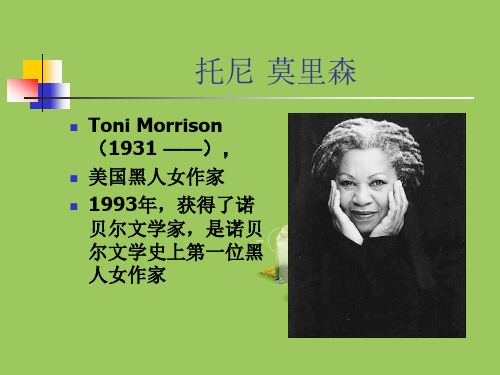
4、爱 、
莫里森的作品,爱是贯穿始终的主题。家庭的 关爱,社区黑人的集体关爱,民族之间的爱, 对自己的爱
5、历史 、
美国黑人如果不愿意接受历史,无论他们到哪 里,到那块大陆都不会有未来。接受自己的过 去——自己的历史——并不等于要沉溺其中, 而是要学会在其中受益。
6、魔幻与现实交替 、
将现实主义和黑人神话结合在一起
主要作品
1、小说 、 《最蓝的眼睛》(The Bluest Eyes,1970) 《苏拉》(Sula, 1973) 《所罗门之歌》(Song of Solomon,1977) 《柏油娃娃》(Tar Baby,1981) 《宠儿》(Beloved,1988) 《爵士乐》(Jazz,1992)
《乐园》(Paradise,1999) 《爱》(Love,2003) 《恩惠》(A Mercy,2008) 短篇小说《宣叙》 短篇小说《宣叙》(Recitatif,1983) 2、剧本 、 《梦想与埃默特》(Dreaming Eemmnet,1985)
主人公 Pecola (佩科 )、叙述者 叙述者Claudia 拉 )、叙述者 克劳蒂亚) (克劳蒂亚) 小女孩对蓝眼睛的热望 铭刻着黑人面临白人文 化侵越时思想上的混乱 和价值观的错位。 和价值观的错位。 莫里森用四季来命名小 说的四个部分, 说的四个部分,其用意 在于要凸现佩科拉悲剧 的不可避免性。 的不可避免性。
3、《所罗门之歌》:主要是研究其主题、 人物、创作手法和神话原型 创作手法的研究很多,视角各异 人物分析从女性和男性两种不同的视角 进入 小说的魔幻现实主义
4、《柏油娃娃》:主要是解读隐喻性和 神话原型以及从性别种族文化方面的分 析。
5、《宠儿》:莫里森分析研究最多的作品。 大多数是从创作手法和思想内容等方面分析 创作手法上关注比较多的是创作角度、叙述策 略和象征意象 思想内容主要是对主题和内容的分析 专门研究《宠儿的论著》,胡笑瑛《不能忘记 的故事;托尼·莫里森<宠儿>的艺术世界》
美国黑人文学和托尼莫里森精品PPT课件

标志着20世纪美国黑人文学史上继赖特、艾里森之 后的又一座高峰。
1993年,被授予该年度诺贝尔文学奖,她是获此殊 荣的第一位美国黑人作家,也是继赛珍珠之后第二 位获得该奖的美国女性作家。
女作家艾丽丝·沃克赞美她:“没有人比托尼·莫里 森写得更美,她始终不懈地探索非洲裔美国人的复 杂性、恐惧和生活中的爱。无理的批评没有阻止她, 过分的赞美也没有使她跌倒,她是配得上这一荣誉 的作家。”
鲍德温和《向苍天呼吁》
五六十年代美国黑人文学的一个主要声音来自小说 家和散文作家鲍德温(James Baldwin)
处女作《向苍天呼吁》(Go Tell on the MOuntain,1953)
在鲍德温看来,美国黑人是美国文明的“私生子”, 其本质是遭遗弃和受辱。
《向苍天呼吁》与赖特的《土生子》和艾里森的 《看不见的人》并列为四五十年代美国黑人文学的 经典作品
In 1949 she entered Howard University(霍华德 大学) in Washington, D.C., America's most distinguished black college. There she changed her name from "Chloe" to "Toni", explaining once that people found "Chloe" too difficult to pronounce.
蓬勃发展
美国黑人文学是在20世纪才真正得以蓬勃发 展。
“哈莱姆文艺复兴运动” 麦凯 (Claude Mckay)、图默(Jean
Toomer)、休斯(Langston Hughes)、 卡伦(Countee Cullen)等一批年轻的诗人和 小说家有意识地从黑人的生活、传统和民间 文化中汲取营养,塑造“新黑人”形象,抒 发黑人的思想感情。
ToniMorrison托尼莫里森
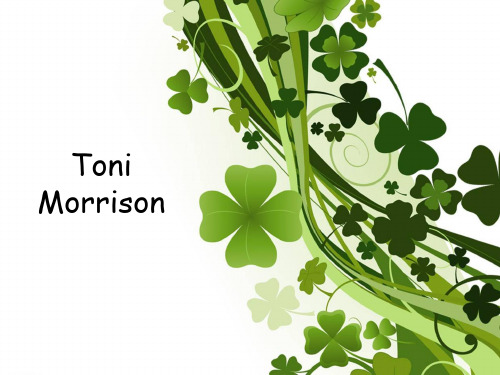
Themes
• Feminism • Racialism
Sethe Sweet Home Mr.and Mrs Garner nephews)
5 slaves Paul A
Paul F
Paul D
Sixo
赎回
Baby Suggs
Halle
schoolteacher (two
Sethe two sons a daughter
A Brief Analysis of Beloved
Background Main Characters Writing Features Themes
Background
Archetype: the true story of Margaret Garner, a fugitive slave, from The Black Book 《黑人之 书》.
Main Characters
4. Baby Suggs
——Sethe's motherin-law. Baby becomes a preacher after Halle buys her freedom, and she provides a stabilizing force for Sethe and Denver.
Lorain was a small industrial town populated with immigrant Europeans, Mexicans and Southern blacks who lived next to each other.
Lorain, Ohio
Life
1949-1953: Howard University (B.A. in English)
托尼。莫里森研究
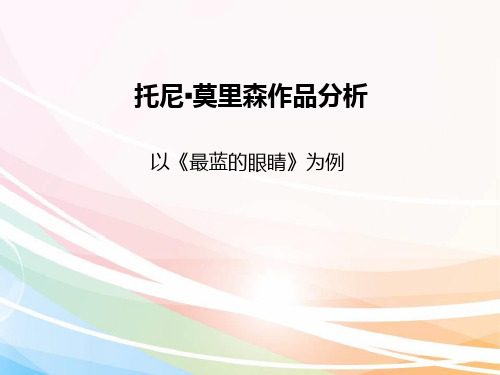
时代背景
《最蓝的眼睛》创作于20世纪70年代,文中描写的故事发 生在40年代,距离总统林肯通过内战废除美国黑奴制度近一 百年,根据美国的法律,黑人具有选举权、参政权等各项权 利,黑人和白人可以一起工作;然而,在社会观念上美国大 众仍然持种族对立态度,事实上的种族歧视遍及生活的各个 方面。作品中,黑人主人公佩克拉是班上唯一单独使用双人 课桌的人;所有的老师都尽量避免去看她,尽量不让她回答 问题;当佩克拉去小店买糖果时,52岁的白人老板竟然感觉 “没有必要浪费他的眼神”,因为对他来说并不存在什么看 得见的东西”,他“怎么会看得见一个黑人小女孩呢?”这 种事“是不可能发生的,更不用说是不值得,也是不必要 的”。莫里森用最令人耻辱的文字披露出她的黑人同胞在种 族歧视严重的美国所遭受的歧视。
家庭
麦克蒂尔一家:自我认同带来的幸福 麦克迪尔太太:心地善良,积极乐观,疼爱子女, 并完全认同自己的黑人身份 父亲:勤勤恳恳,保护家园,为妻子,为女儿不 辞辛劳 弗里达和克劳迪娅姐妹:独立,自信,勇敢又不 乏爱心
“镜 像 阶 段”理论是雅克· 拉康的代表理论.
所谓“镜像期”大约发生在幼儿6至18个月之间.在此阶段, 尽管幼儿的身体还非常柔弱,但其视觉神经却足以发达到 可以辨认出镜中的影像的程度。幼儿与黑猩猩不同,当其 发现镜中的影像的时候会对这种影像产生一种认同。起初, 他把这种影像看作是一个现实存在的事物,并试图捕捉或 触摸它。随后,他辨识出影像与真人的区别,不再试图触 摸,而把这种影像看作是他人的影像。最后,幼儿通过对 影像的观察发现这个影像软是他自己的身体的表现,从而 达到了对其自身的认同。(佩科拉对自我的认识)正是镜子里代
1953年她在哈佛大学获英语学士学位后,又于1955年获 科内尔大学硕士学位。 在黑人文化的影响和熏陶下,在白人文化为主流的美国, 她以黑人民族文化为荣,称自己是“黑人”女作家。 此后,她在南得克萨斯大学和哈佛大学教授英语。 她曾与一位名叫哈里德· 莫里森的建筑师结婚,生有二子, 但于1964年离异。 1993年,被授予该年度诺贝尔文学奖,她是获此殊荣的 第一位美国黑人作家,也是继赛珍珠之后第二位获得该奖 的美国女性作家 以一个女人的眼光来描写美国黑人的经历, 通过各种不同 的人物和他们的斗争, 揭示这个建立在种族偏见基础上的 社会中的罪恶
绿皮书电影赏析PPT课件

《绿皮书》是一部反对种族隔离的杰作,该片在 第91届奥斯卡金像奖中斩获最佳影片、最佳原创 剧本和最佳男配角3项大奖。
LOGO
觅知影视
第三部分
影片赏析
The film is adapted from a real-life story and tells the story of bodyguard Tony being hired as the world's outstanding classical pianist Tang Qiqi
唐一路上都对于自己与遇到的偏 见忍气吞声,在托尼的鼓励下, 他开始积极地反抗偏见。他对托 尼也逐渐消除了隔阂,甚至帮助 托尼润色他写给妻子的家书。 两个人在这场旅途中都改变了对 方,获得了新生。
LOGO
觅知影视
第四部分
经典台词
The film is adapted from a real-life story and tells the story of bodyguard Tony being hired as the world's outstanding classical pianist Tang Qiqi
经典台词
Whatever you do, do it a hundred percent. 不管你做什么,都要做到极致。
I suffer that slight alone, because I’m not like them either. 我独自忍受轻视,因为我不为自己的 同胞接受,因为我和他们不一样。
LOGO
觅知影视
第二部分
关于电影
The film is adapted from a real-life story and tells the story of bodyguard Toorld's outstanding classical pianist Tang Qiqi
托尼莫里森致辞诺贝尔文学奖
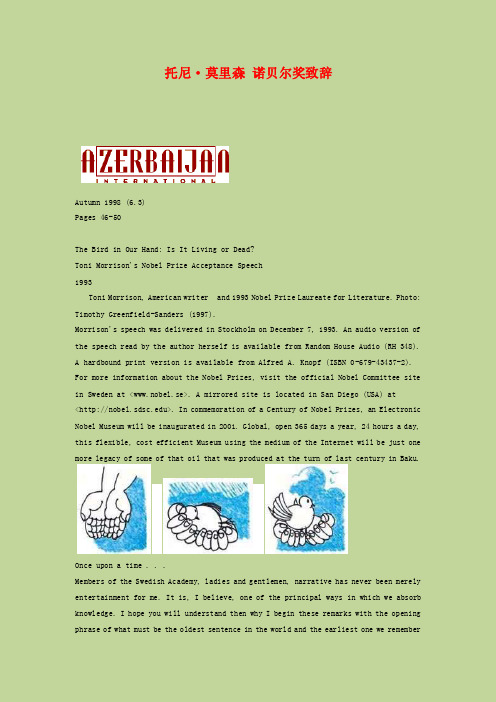
托尼·莫里森诺贝尔奖致辞Autumn 1998 (6.3)Pages 46-50The Bird in Our Hand: Is It Living or Dead?Toni Morrison's Nobel Prize Acceptance Speech1993Toni Morrison, American writer and 1993 Nobel Prize Laureate for Literature. Photo: Timothy Greenfield-Sanders (1997).Morrison's speech was delivered in Stockholm on December 7, 1993. An audio version of the speech read by the author herself is available from Random House Audio (RH 348).A hardbound print version is available from Alfred A. Knopf (ISBN 0-679-43437-2). For more information about the Nobel Prizes, visit the official Nobel Committee site in Sweden at <www.nobel.se>. A mirrored site is located in San Diego (USA) at<>. In commemoration of a Century of Nobel Prizes, an Electronic Nobel Museum will be inaugurated in 2001. Global, open 365 days a year, 24 hours a day, this flexible, cost efficient Museum using the medium of the Internet will be just one more legacy of some of that oil that was produced at the turn of last century in Baku.Once upon a time . . .Members of the Swedish Academy, ladies and gentlemen, narrative has never been merely entertainment for me. It is, I believe, one of the principal ways in which we absorb knowledge. I hope you will understand then why I begin these remarks with the opening phrase of what must be the oldest sentence in the world and the earliest one we rememberfrom childhood, "Once upon a time.""Once upon a time there was an old woman. Blind but wise." Or was it an old man? A guru, perhaps. Or a griot soothing restless children. I have heard this story, or one exactly like it, in the lore of several cultures."Once upon a time there was an old woman. Blind. Wise."In the version I know, the woman is the daughter of slaves, black, American, and lives alone in a small house outside of town. Her reputation for wisdom is without peer and without question.Among her people, she is both the law and its transgression. The honor she is paid and the awe in which she is held reach beyond her neighborhood to places far away; to the city where the intelligence of rural prophets is the source of much amusement.One day the woman is visited by some young people who seem bent on disprovin g her clairvoyance and showing her up for the fraud they believe she is. Their plan is simple: they enter her house and ask the one question the answer to which rides solely on her difference from them, a difference they regard as a profound disability: he r blindness. They stand before her, and one of them says."Old woman, I hold in my hand a bird. Tell me whether it is living or dead."She does not answer, and the question is repeated. "Is the bird I am holding living or dead?"Still she does not answer. She is blind and cannot see her visitors, let alone what is in their hands. She does notknow their color, gender or homeland. She only knows their motive.The old woman's silence is so long, the young people have trouble holding their laughter.Finally she speaks, and her voice is soft but stern. "I don't know," she says. "I don't know whether the bird you are holding is dead or alive, but what I do know is that it is in your hands. It is in your hands."Her answer can be taken to mean: if it is dead, you have either found it that way or you have killed it. If it is alive, you can still kill it. Whether it is to stay alive is your decision. Whatever the case, it is your responsibility.For parading their power and her helplessness, the young visitors are reprimanded, told they are responsible not only for the act of mockery but also for the small bundle of life sacrificed to achieve its aims. The blind woman shifts attention away from assertions of power to the instrument through which that power is exerci sed.Speculation on what (other than its own frail body) that bird in the hand might signify has always been attractive to me, but especially so now, thinking as I have been about the work I do that has brought me to this company. So I choose to read the b ird as"language" and the woman as a "practiced writer."She is worried about how the language she dreams in, given to her at birth, is handled, put into service, even withheld from her for certain nefarious purposes. Being a writer, she thinks of language partly as a system, partly as a living thing over which one has control.But mostly as agency - as an act with consequences. So the question the children put to her, "Is it living or dead?" is not unreal, because she thinks of language as susceptible to death, erasure; certainly imperiled and salvageable only by an effort of the will. She believes that if the bird in the hands of her visitors is dead, the custodians are responsible for the corpse.For her, a dead language is not only one no longer spoken or written, it is unyielding language content to admire its own paralysis. Like status language, censored and censoring. Ruthless in its policing duties, it has no desire or purpose other than to maintain the free range of its own narcotic narcissism, its own exclusivity and dominance.However moribund, it is not without effect, for it actively thwarts the intellect, stalls conscience, suppresses human potential. Unreceptive to interrogation, it cannot form or tolerate new ideas, shape other thoughts, tell another story, fill baffling silences. Official language smitheried to sanction ignorance and preserve privilege is a suit of armor, polished to shocking glitter, a husk from which the knight departed long ago. Yet there it is; dumb, predatory, sentimental.Exciting reverence in schoolchildren,providing shelter for despots,summoning false memories of stability,harmony among the public.She is convinced that when languagedies, out of carelessness, disuse,indifference, and absence of esteem, orkilled by fiat, not only she herself butall users and makers are accountable for its demise.The first oil tanker, the Zoroaster, which belonged to the Nobel Brothers (late 1800s). In her country, children have bitten their tongues off and use bullets instead to iterate the void of speechlessness, of disabled and disabling language, of language adults have abandoned altogether as a device for grappling with meaning, providing guidance, orexpressing love.But she knows tongue-suicide is not only the choice of children. It is common among the infantile heads of state and power merchants whose evacuated language leaves them with no access to what is left of their human instincts, for they speak only to those who obey, or in order to force obedience.The systematic looting of language can be recognized by the tendency of its users to forgo its nuanced, complex, mid-wifery properties, replacing them with menace and subjugation. Oppressive language does more than represent violence; it is violence; does more than represent the limits of knowledge; it limits knowledge.Whether it is obscuring state language or the faux language of mindless media; whether it is the proud but calcified language of the academy or the commodity-driven language of science; whether it is the malign language of law-without-ethics, or language designed for the estrangement of minorities; hiding its racist plunder in its literary cheek - it must be rejected, altered and exposed.It is the language that drinks blood, laps vulnerabilities, tucks it s fascist boots under crinolines of respectability and patriotism as it moves relentlessly toward the bottom line and the bottomed-out mind. Sexist language, racist language, theistic language - all are typical of the policing languages of mastery, and can not, do not, permit new knowledge or encourage the mutual exchange of ideas.The old woman is keenly aware that no intellectual mercenary or insatiable dictator, no paid-for politician or demagogue, no counterfeit journalist would be persuaded by her thoughts. There is, and will be, rousing language to keep citizens armed and arming; slaughtered and slaughtering in the malls, courthouses, postoffices, playgrounds, bedrooms and boulevards; stirring, memorializing language to mask the pity and waste of needless death.There will be more diplomatic languge to countenance rape, torture, assassination. There is, and will be, more seductive, mutant language designed to throttle women, to pack their throats like paté-producing geese with their own unsayable, transgressive words; there will be more of the language of surveillance disguised as research; of politics and history calculated to render the suffering of millions mute; language glamorized to thrill the dissatisfied and bereft into assaulting their neighbors; arrogant pseudo-empirical language crafted to lock creative people into cages of inferiority and hopelessness.Underneath the eloquence, the glamour, the scholarly associations, however stirring or seductive, the heart of such language is languishing, or perhaps not beating at all - if the bird is already dead.She has thought about what could have been the intellectual history of any discipline if it had not insisted upon, or been forced into, the waste of time and life that rationalizations for and representations of dominance required - lethal discourses of exclusion blocking access to cognition for both the excluder and the excluded.The conventional wisdom of the Tower of Babel story is that the collapse was a misfortune. That it was the distraction or the weight of many languages that precipitated the tower's failed architecture. That one monolithic language would have expedited the building and heaven would have been reached. Whose heaven, she wonders? And what kind? Perhaps the achievement of Paradise was premature, a little hasty if no one could take the time to understand other languages, other views, other narratives. Had they, the heaven they imagined might have been found at their feet. Complicated, demanding, yes, but a view of heaven as life; not heaven as post-life.She would not want to leave her young visitors with the impression that language should be forced to stay alive merely to be. The vitality of language lies in its ability to limn the actual, imagined and possible lives of its speakers, readers, writers. Although its poise is sometimes in displacing experience, it is not a substitute for it.It arcs toward the place where meaning may lie. When a President of the United States [Abraham Lincoln] thought about the graveyard his country had become, and said [at his address at Gettsyburg in 1863],"The world will little note nor long remember what we say here. But it will never forget what they did here," his simple words were exhilarating in their life-sustaining properties because they refused to encapsulate the reality of 600,000 dead men in a cataclysmic race war.Refusing to monumentalize, disdaining the "final word," the precise "summing up," acknowledging their "poor power to add or detract," his words signal deference to the uncapturability of the life it mourns. It is the deference that moves her, that recognition that language can never live up to life once and for all. Nor should it. Language can never "pin down" slavery, genocide, war. Nor should it yearn for the arrogance to be able to do so. Its force, its felicity, is in its reach toward the ineffable.Be it grand or slender, burrowing, blasting or refusing to sanctify; whether it laughs out loud or is a cry without an alphabet, the choice word or the chosen silence, unmolested language surges toward knowledge, not its destruction. But who does not know of literature banned because it is interrogative; discredited because it is critical; erased because alternate? And how many are outraged by the thought of a self-ravaged tongue?Word-work is sublime, she thinks, because it is generative; it makes meaning that securesour difference - our human difference - the way in which we are like no other life. We die. That may be the meaning of life. But we do language. That may be the measure of our lives."Once upon a time. . ." Visitors ask an old woman a question. Who are they, these children? What did they make of that encounter? What did they hear in those final words: "The bird is in your hands?" A sentence that gestures toward possibility, or one that drops a latch? Perhaps what the children heard was, "It is not my problem. I am old, female, black, blind. What wisdom I have now is in knowing I cannot help you. The future of language is yours."They stand there. Suppose nothing was in their hands. Suppose the visit was only a ruse, a trick to get to be spoken to, taken seriously as they have not been before. A chance to interrupt, to violate the adult world, its miasma of discourse about them. Urgent questions are at stake, including the one they have asked: "Is the bird we hold living or dead?" Perhaps the question meant: "Could someone tell us what is life? What is death?" No trick at all; no silliness. A straightforward question worthy of the attention of a wise one. An old one. And if the old and wise who have lived life and faced death cannot describe either, who can?But she does not; she keeps her secret, her good opinion of herself, her gnomic pronouncements, her art without commitment. She keeps her distance, enforces it and retreats into the singularity of isolation, in sophisticated, privileged space. Nothing, no word follows her declaration of transfer. That silence is deep, deeper than the meaning available in the words she has spoken. It shivers, this silence, and the children, annoyed, fill it with language invented on the spot."Is there no speech," they ask her, "no words you can give us that help us break through your dossier of failures? Through the education you have just given us that is no education at all because we are paying close attention to what you have done as well as to what you have said - to the barrier you have erected between generosity and wisdom? "We have no bird in our hands, living or dead. We have only you and our important question. Is the nothing in our hands something you could not bear to contemplate, to even guess? Don't you remember being young, when language was magic without meaning?"When what you could say, could not mean? When the invisible was what imagination strove to see? When questions and demands for answers burned so brightly you trembled with fury at not knowing?"Do we have to begin consciousness with a battle heroes and heroines like you have already fought and lost, leaving us with nothing in our hands except what you have imagined is there? Your answer is artful, but its artfulness embarrasses us and ought to embarrassyou. Your answer is indecent in its self-congratulation. A made-for-television script that makes no sense if there is nothing in our hands."Why didn't you reach out, touch us with your soft fingers, delay the sound bite, the lesson, until you knew who we were? Did you so despise our trick, our modus operandi, that you could not see that we were baffled about how to get your attention? We are young. Unripe. We have heard all our short lives that we have to be responsible. "What could that possibly mean in the catastrophe this world has become; where, as a poet said, 'nothing needs to be exposed since it is already barefaced?' Our inheritance is an affront. You want us to have your old, blank eyes and see only cruelty and mediocrity."Do you think we are stupid enough to perjure ourselves again and again with the fiction of nationhood? How dare you talk to us of duty when we stand waist deep in the toxin of your past?"You trivialize us and trivialize the bird that is not in our hands. Is there no context for our lives? No song, no literature, no poem full of vitamins, no history connected to experience that you can pass along to help us start strong? You are an adult. The old one, the wise one."Stop thinking about saving your face. Think of our lives and tell us your particularized world. Make up a story. Narrative is radical, creating us at the very moment it is being created. We will not blame you if your reach exceeds your grasp; if love so ignites your words that they go down in flames and nothing is left but their scald."Or if, with the reticence of a surgeon's hands, your words suture only the places where blood might flow. We know you can never do it properly - once and for all. "Passion is never enough; neither is skill. But try. For our sake and yours forget your name in the street; tell us what the world has been to you in the dark places and in the light. Don't tell us what to believe, what to fear. Show us beli ef's wide skirt and the stitch that unravels fear's caul."You, old woman, blessed with blindness, can speak the language that tells us what only language can: how to see without pictures. Language alone protects us from the scariness of things with no names. Language alone is meditation."Tell us what it is to be a woman so that we may know what it is to be a man. What moves at the margin. What it is to have no home in this place. To be set adrift from the one you knew. What it is to live at the edge of towns that cannot bear your company. "Tell us about ships turned away from shorelines at Easter, placenta in a field. Tell us about a wagonload of slaves, how they sang so softly their breath was indistinguishable from the falling snow. How they knew from the hunch of the nearestshoulder that the next stop would be their last."How with hands prayered in their sex, they thought of heat, then sun. Lifting their faces as though it was there for the taking. Turning as though there for the taking. They stop at an inn. The driver and his mate go in with the lamp, leaving them humming in the dark. The horse's void steams into the snow beneath its hooves and the hiss and melt are the envy of the freezing slaves."The inn door opens: a girl and a boy step away from its light. They climb into the wagon bed. They boy will have a gun in three years, but now he carries a lamp and a jug of warm cider. They pass it from mouth to mouth."The girl offers bread, pieces of meat and something more: a glance into the eyes of the one she serves. One helping for each man, two for each woman. And a look. They look back. The next stop will be their last. But not this one. This one is warmed."It's quiet again when the children finish speaking, until the woman breaks into the silence."Finally," she says. "I trust you now. I trust you with the bird that is not in your hands because you have truly caught it. Look. How lovely it is, this thing we have done - together."“在从前某个时候有一个老妇。
Toni Morrison
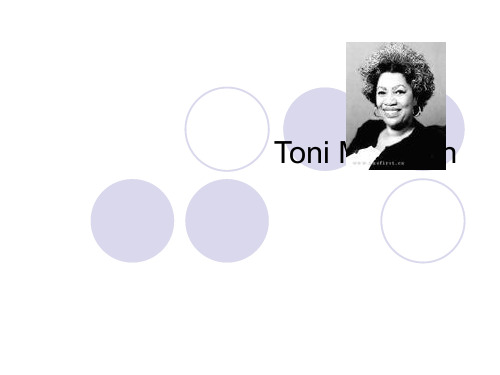
中文名:托尼· 莫里森 外文名:Toni Morrison 别名:琪洛· 沃尔德 国籍:美国 民族:非洲裔 出生地:美国俄亥俄州克里夫兰 出生日期:1931年2月18日 职业:黑人女作家 毕业院校:康奈尔大学 主要成就:1993年诺贝尔文学奖
这些使她接触了丰富、翔实而系统的美国 黑人历史和素材,为她后来的观念和创作 提供了良好的基础。此后,文学创作上的 成功使离异后独自带着两个儿子生活的她 (她于1964年与丈夫离婚)勇敢地辞去了 编辑职务,成为专业作家,并先后在纽约 州立大学、耶鲁大学、巴尔德学院和普林 斯顿大学等院校讲授黑人文学及魔幻现实 主义。
人物简介
托妮· 莫里森(Toni Morrison,1931~) 美国黑人女作家,生于美国俄亥俄州克 里夫兰附近的罗伦镇 ,儿时恰逢经济大 萧条,父亲要做三份工,母亲还要给人 家帮佣,全家才能勉强糊口。托妮的父 母都是极有个性的人:父亲会在他参与 制造的船上刻下自己的名字;母亲曾把 收租人赶出了家门。小托妮是在父亲的 故事和母亲的歌声中长大的。从小身处 的种族歧视环境,加之父母的熏陶,使 她具备了强烈的民族意识和浓厚的文艺 兴趣,这为她后来的写作种下了第一颗 种子。
在写过一个女孩和一个 姑娘之后,这位把文学 创作视为“一生中所尊 重的事业”的女作家才 开始谨慎地写男人,这 就是发表于1977年的 《所罗门之歌》。
从1966年起,托妮作为兰多姆出版社的高 级编辑,平均每年都要编辑六七本书,其 中有囊括三百年间美国黑人史料、被称为 美国黑人史百科全书的图文并茂的《黑人 之书》,以及《拳王阿里自传》等。
Thanks
《柏油孩子》Tar Baby (1981) 《宠儿》 Beloved (1988,获普利策奖) 《爵士乐》 Jazz (1992)
- 1、下载文档前请自行甄别文档内容的完整性,平台不提供额外的编辑、内容补充、找答案等附加服务。
- 2、"仅部分预览"的文档,不可在线预览部分如存在完整性等问题,可反馈申请退款(可完整预览的文档不适用该条件!)。
- 3、如文档侵犯您的权益,请联系客服反馈,我们会尽快为您处理(人工客服工作时间:9:00-18:30)。
3、2019年,国内的莫里森研究出现重大突破。 王守仁和吴新云《性别·种族·文化——托尼莫
里森的小说创作》 之后,关于莫里森的研究开始丰富起来
主人公 Pecola (佩科 拉 )、叙述者Claudia (克劳蒂亚)
小女孩对蓝眼睛的热望 铭刻着黑人面临白人文 化侵越时思想上的混乱 和价值观的错位。
莫里森用四季来命名小 说的四个部分,其用意 在于要凸现佩科拉悲剧 的不可避免性。
《秀拉》
创作于1973 掀开黑人女性文学
批评的新篇章
《所罗门之歌》
创作于1977年 运用神话和民间传
说以及形象的手法
4、爱
莫里森的作品,爱是贯穿始终的主题。家庭的 关爱,社区黑人的集体关爱,民族之间的爱, 对自己的爱
5、历史
美国黑人如果不愿意接受历史,无论他们到哪 里,到那块大陆都不会有未来。接受自己的过 去——自己的历史——并不等于要沉溺其中, 而是要学会在其中受益。
6、魔幻与现实交替
将现实主义和黑人神话结合在一起
写作主题
1、美国黑人妇女的困惑与自救
身为黑人和女性,我能进入那些不是黑人,不 是女性的人所不能进入的一个感情和感受的宽 广领域
2、种族与苦难
以现代艺术和人性的光芒实现对诸如黑人妇女 这样的双重弱势群体的观照和关怀,为她们和她 们的心灵修史
3、自我追寻和文化定位
莫里森的创作目的是“在这个人人都不同程度 受害的世界上完整的生存”
6、《爵士乐》:主要是从叙事特点角度 去论述。
7、《乐园》 8、《爱》 9、《恩惠》
标志着20世纪美国黑人文学史上继赖特、艾里 森之后的又一座高峰。
访谈录的翻译资料有四篇
1、余正、邹旭东翻译的尼利·麦凯与莫 里森的访谈录
2、王家湘摘译的“访托尼·莫里森” 3、少况译的托马斯·勒克莱尔与莫里森
的访谈录“语言不能流汗”
4、托马斯·勒克莱尔采访的
莫里森生平、思想和创作的总体研究
1、20世纪80年代初期,国内开始对莫里森进 行零星介绍
4、编辑出版了黑人丛书以及《种族正义、性 别权力:论安尼塔·希尔,克拉伦斯以社会现实 的建构》(Race-ing Justice, En-Gendering Power: Essays on Anita Hill, Clarence Thomas, and the Construction of Social Reality,1993 )
莫里森作品及其研究的译介出版
ቤተ መጻሕፍቲ ባይዱ 1980年到80年代中后期,译介主要限于对 部分书名的翻译和对部分作品的简要介绍
1984年,吴巩展选译了Tar Baby的第九章, 译名是《黑婴》
1993年莫里森获诺贝尔奖后作品开始增加 21世纪,国内译届对莫里森的关注持续升
温
莫里森文论翻译,主要有三篇
小说的魔幻现实主义
4、《柏油娃娃》:主要是解读隐喻性和 神话原型以及从性别种族文化方面的分 析。
5、《宠儿》:莫里森分析研究最多的作品。 大多数是从创作手法和思想内容等方面分析
创作手法上关注比较多的是创作角度、叙述策 略和象征意象
思想内容主要是对主题和内容的分析
专门研究《宠儿的论著》,胡笑瑛《不能忘记 的故事;托尼·莫里森<宠儿>的艺术世界》
豪伍德大学 4、还曾任教于耶鲁大学、纽约州立大学阿本尼
分校和拉杰斯大学(Rutgers Univ University ) 5、现任普林斯顿大学古典文学教授。
主要作品
1、小说 《最蓝的眼睛》(The Bluest Eyes,1970) 《苏拉》(Sula, 1973) 《所罗门之歌》(Song of Solomon,1977) 《柏油娃娃》(Tar Baby,1981) 《宠儿》(Beloved,1988) 《爵士乐》(Jazz,1992)
托尼·莫里森
Toni Morrison (1931 ——),
美国黑人女作家 1993年,获得了诺
贝尔文学家,是诺贝 尔文学史上第一位黑 人女作家
生平
1、1931年出生于俄亥俄州的诺兰(Loran Ohio) 2、先后受教于豪伍德大学(Howard University)
康乃尔大学 (Cornell Univrsity) 3、后授书于南德州大学(Texas ) Southern University
1、盛宁节译莫里森的获奖演说词“剥夺的语 言和语言的剥夺”(The Looting of language)
2、陶洁翻译了莫里森的文论《黑暗中的游戏》 中一个章节“令人不安的护士,心底善良的鲨 鱼”(Disturbing Nurses and Kindness of Sharks)
3、陈陆鹰、汪立新翻译了莫里森的文论《黑 人的存在不可忽视》
的分析 单独对人物分析比较少
2、《秀拉》:国内研究主要是主题分析、 叙述特征分析和女性主义等方面
主题分析主要是女性的自我建构和价值 实现
特征分析中叙事特征分析相对较多
3、《所罗门之歌》:主要是研究其主题、 人物、创作手法和神话原型
创作手法的研究很多,视角各异
人物分析从女性和男性两种不同的视角 进入
《乐园》(Paradise,2019) 《爱》(Love,2019) 《恩惠》(A Mercy,2019) 短篇小说《宣叙》(Recitatif,1983)
2、剧本 《梦想与埃默特》(Dreaming Eemmnet,1985)
3、童话诗 大盒子(The Big Box,1988)
《柏油娃娃》
创作于1981 非洲民间和神话故事
的体现
《宠儿》 创作于1987年 历史性小说 魔幻现实主义手法
《爵士乐》
创作于1992年 到现在最后一部长篇
小说
莫里森主要作品的分析解读
1、《最蓝的眼睛》:研究主要集中在主 题分析、创作手法和人物分析
主题研究主要从性别种族文化的角度 创作手法:小说的结构评析和对象征意象
